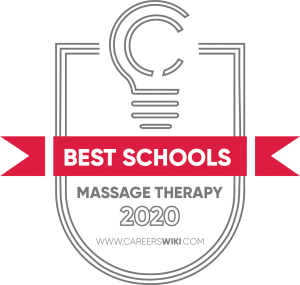…
There are six massage therapy schools in West Virginia. Each is located in a different city or town. They include privately owned institutes and publicly operated colleges.
Most of the schools award MT certificates, which require as few as five months to earn. One community college offers an associate degree in the field. Students hear lectures in classrooms, receive training in labs, and get experience in clinics.
Employment opportunities in massage therapy are growing at a fast clip in the Mountain State. An additional 70 jobs will become available annually until 2026, according to federal government projections.
You might also like to view our best massage programs and schools in other states.

With a mission to “protect the public,” this state agency “is responsible for assuring the appropriate conduct and proper education of all practicing professional massage therapists operating in the state.”
The board establishes education and examination requirements for practitioners, issues licenses to them, and creates rules for license renewals and continuing education. An additional duty is to set standards for schools concerning accreditation, curriculum content, administrators and instructors, facilities and equipment, sanitation, and student-to-teacher ratios.
The board investigates and holds hearings regarding allegations of illegal or unethical conduct. Disciplinary actions include license suspensions and revocations.
The five members of the board are appointed by the governor, with approval from the state Senate. Three of the officials must be licensed massage therapists, one is an osteopathic physician or chiropractor, and one is a lay person.
To become a massage therapist in West Virginia, completing a high school education or earning a general education diploma is the initial step. College-prep classes in science and health are beneficial.
Students need to attend a massage school that the state board has approved. The program must feature 500 or more content hours of supervised instruction, with the following components:
Time spent in a student clinic or fieldwork assignment may not exceed 100 hours. Certificate programs are allowed to take at least six months to complete, and daily instructional hours are limited to eight. A 16:1 or better student-to-instructor ratio is required in hands-on practice classes.
Earning a certificate or degree entitles a student to apply to the state board for a license to practice in West Virginia. One licensure prerequisite is registering with the Federation of State Massage Therapy Boards to take a national certification test called the Massage and Bodywork Licensing Examination.
Practicing LMTs must earn license renewals every second year. The board calls for 24 credits of continuing education, including at least three hours in ethics.
We selected the schools below based on the programs that they offer, accreditation, student population, graduation rate and reputation.
View our Ranking Methodology to learn more about how we rank schools.

93%
18
This Charleston school was the first in the state to earn recognition from the esteemed Commission on Massage Therapy Accreditation. Students learn “holistic healing methods” based on the “mind, body, and spirit.”
The 775-content-hour program is available during the day for 32 weeks, or at night for 43 weeks. In addition to covering state requirements, courses include Swedish Massage, Deep Tissue Therapy, Neuromuscular Therapy, Seated Chair Massage, Esoteric Anatomy and Bodywork Theory, Hydrotherapy, Research Methodology, and Awareness Skills.
Program participants apply their newly acquired skills at a student clinic that serves the public. Graduates return for continuing education workshops.
56%
48
This school in downtown Clarksburg boasts “the most up-to-date and competent instruction available” in cosmetology, nail technology, and massage therapy.
The MT program, consisting of 600 content hours, takes 18 weeks to finish. Students are trained in Swedish, chair, sports, and connective tissue massage techniques. They also learn neuromuscular therapy, Shiatsu, polarity therapy, reflexology, hydrotherapy, and CPR and first aid.
Each student administers at least 50 full-body massages to real clients in an on-campus clinic. The school claims that the facility, which features individual work stations, “mimics the salon experience.”
58%
87
With a history dating to 1946, MBC has been training massage practitioners since 2002. The Commission on Massage Therapy Accreditation sanctions the program.
Students attend daytime classes full time for seven months. There are 750 content hours of instruction and clinics. Courses address massage modalities such as Swedish, therapeutic, deep tissue, medical, pregnancy, special populations, sports, cancer, and stone.
Among additional classes are Aromatherapy, CPR/First Aid, Herbs, Eastern Perspectives, Self-Care, Nutrition, Energy Medicine, Passive Movement, Traditional Chinese Medicine, and Pharmacology. The program includes 100 hours of massages in a student clinic.
81%
135
This small public Martinsburg school offers nine postsecondary career programs. The MT curriculum has won approval from the Commission on Massage Therapy Accreditation.
The five-month, daytime program entails 1,200 content hours. Students become proficient in spa and clinical modalities, such as Swedish, deep tissue, myofascial, chair, sports, and orthopedic massage. Students hear guest speakers, take part in community outreach projects, and serve the public in the JRTI clinic.
Program applicants must post acceptable scores in reading, math, and other subjects on the TABE basic skills test. The school teaches interviewing and resume writing, and helps students find jobs.
15%
1169
More than 60 career training options are available at this public institution, including an MT program that the National Certification Board for Therapeutic Massage and Bodywork recognizes.
MT students attend classes during the day or at night, beginning in August, on the Greenbrier Valley campus. The 30-credit curriculum spans two semesters. Massage courses teach Swedish, Eastern, deep tissue, sports, seated chair, and special populations techniques.
Among the services in the school’s student clinic are Swedish, seated chair, hot stone, aromatherapy, Ayurvedic head, and foot reflexology treatments. Program applicants must take placement tests in reading, writing, and math.
23%
1873
A public school in Huntington, MCTC offers more than 50 programs. It awards an associate in applied science degree in massage therapy that emphasizes “a holistic approach.” Students gain an “understanding that there are physical, mental, emotional, and spiritual components to each individual.”
The 61-credit curriculum exceeds state requirements by adding these core courses: Medical Terminology, Written Communication, Oral Communication, Kinesiology, Eastern Theory, Pharmacology, Shiatsu, Deep Tissue, and Spa Theory.
Program participants apply integrative massage techniques to community members in a student clinic. The school provides academic advising, professional counseling, mental health services, and employment assistance.
$15.7
$32,620
25%
About $32,620 per year or $15.70 an hour is the median income for practitioners in West Virginia. Nationally, the average is around $41,420 or nearly $20.
Massage therapists in the upper one-tenth of earners in the state receive almost $60,700 or about $29.20—not as good as the U.S. average of approximately $78,300 or $37.65. Those in West Virginia’s lowest one-tenth make about $19,440 or $9.35—compared to around $21,340 or $10.25 nationwide.
Practitioner jobs here, which totaled 410 in 2016, are projected to reach 510 within the ensuing decade. If that is the case, the 25% expansion rate will nearly mirror the expected U.S. median of 26%.
Sources: U.S. Bureau of Labor Statistics, CareerOneStop

LIMITED TIME DEAL